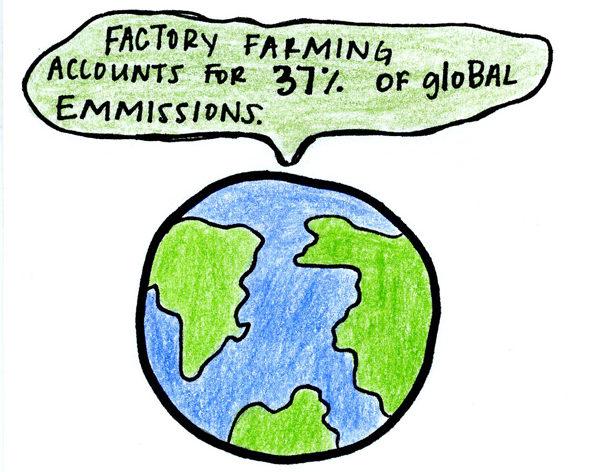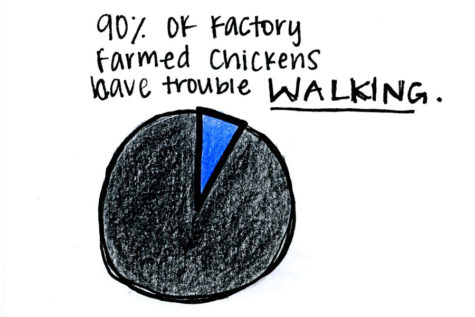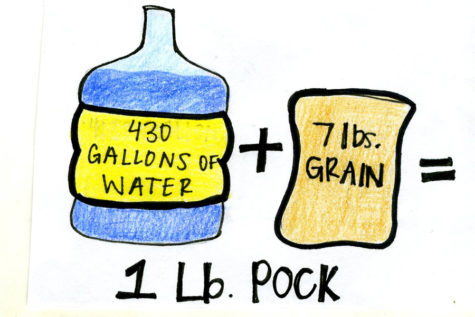Factory Farming: The Widespread Epidemic

97 percent of egg laying hens in the United States are factory farmed and 99.9 percent of chickens used for slaughter are factory farmed.
March 29, 2017
In the United States, the average person consumes over 270 pounds of meat per year. Of this, 99 percent of it is factory farmed, which means that this meat is full of antibiotics, unnatural hormones, animal feces, unhealthy bacterias, and dangerous germs, all of which can be detrimental to your health. You’re probably thinking… ‘Can this be right? Am I really eating meat that is harmful to my health?’. The answer is yes. Factory farming has become the biggest unacknowledged threat to the health of Americans.
A factory farm is a large-scale, industrial factory that crams together thousands of animals to be raised for food. Some of the most common factory farmed animals include cows, chickens, turkeys, and pigs.
The life of an animal raised in a factory farm is unnatural and unnerving. 97 percent of egg laying hens in the United States are factory farmed and 99.9 percent of chickens used for slaughter are factory farmed. Factory farmed chickens are reared in cruel conditions that manipulate their natural growing process. For egg-laying chickens, the birds undergo a forced molting process. Forced molting is a strategy used by factory farms on hens to increase their egg production. Natural molting usually occurs after the winter as the chickens discard old feathers and grow new ones. After molting, the chickens lay more eggs, since springtime occurs after the natural molting process. These factory farms activate forced molting by starving the entire flock for up to 14 days, while inducing changing light patterns to shock the hens into molting their feathers. This forced process causes physiological stress on the chickens and up to 10 percent of the flock dies during this process. As if it weren’t bad enough already, both egg-laying and slaughter chickens are often confined in “battery cages”. Smaller than the size of an iPad, these cages are designed to pack as many chickens into the smallest space possible. Additionally, all male chicks, because they cannot lay eggs, are deemed “not useful” by these large factory-farm owning corporations. Male chicks are either piled up and left to suffocate in trash bags, or tossed into a grinder while still alive, to be used as feed for the remaining birds.

Chickens are not the only animals that are being degraded by these large-scale, profit-driven commercial operations. Dairy cattle raised in factory farms have significantly decreased lifespans. Factory farmed beef cattle are fed corn and other crops that have been genetically modified–foods that cows do not naturally consume. In addition, at the time of slaughter around 80 percent of pigs have pneumonia, which infects the meat that will be consumed by humans. Almost all animals raised in factory farms live their entire lives in total darkness with no fresh air, all while standing or lying in their own feces.
All of the antibiotics, germs, feces, and bacteria can– and often does–contaminate the eggs, milk, and meat that comes from these animals. In 2015, the top 10 worst foodborne illnesses in the United States were byproducts of E. Coli, Shigella, Staphylococcus aureus, Cyclospora, and Salmonella, all of which can be transferred through feces and germs that are in abundance within factory farms.

Many practices used on factory farms are not sustainable or efficient, especially in the pork industry where 430 gallons of water and 7 pounds of grain amount to only a pound of pork.
Factory farms degrade animals by not recognizing that they are living, breathing creatures. Raising animals in such horrible conditions shows lack of compassion by treating them as only a “piece of meat”. Almost all meat and dairy products are produced from factory farming, which will continue to take away more healthy food choices if we don’t stand up and demand change. Next time you’re at the grocery store, keep an eye out for meat, eggs, and milk that is specifically labeled “certified free-range”. This “free-range” labeling indicates that the animals roamed freely outdoors, as opposed to be being confined in a tiny space indoors 24 hours a day.
Factory farming is not a process that can be ignored any longer. Our health is directly affected by the food we eat. If we continue to consume meat and dairy that contains the pathogens that result from the conditions of factory farming, dangerous illnesses and medicine-resistant, bacteria will continue to emerge. It is time to reject factory farming and decline supporting these operations which promote the cruel treatment of animals. Know where your food comes from.
Sources in this story were compiled from: Huffington Post, DoSomething.org, and Foodsafetynews.com.



Poor Animal • Sep 16, 2017 at 3:04 am
The Horror of worldwide factory farming:
http://live-counter.com/animals-killed-worldwide/